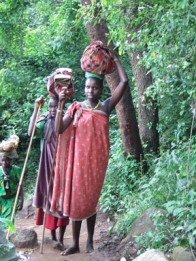Four years after the end of the 22-year-old Sudanese civil war, returnees continue to face extreme hardships as they attempt to go back to their homes, many facing hunger, disease, and general neglect during their journeys from north Sudan, as well as various other countries, to their place of origin in the South, said the Adventist Development and Relief Agency (ADRA).
As part of an effort to help many returnees on transit make a smooth transition to their homelands, ADRA manages six way stations in the states of White Nile, Jonglei, Central Equatoria, and the Upper Nile, one of which is the largest way station in Sudan. These way stations, several located along the Nile River, can assist up to 2,300 people at any given time by providing temporary shelter, food assistance, and resettlement orientation. Since the start of this project in 2007, ADRA Sudan Southern Sector has reintegrated more than 16,200 people.
“By the time the returnees reach the way station, they are very eager to arrive at their homes,” said Emmanuel Chigogora, programs director for ADRA Sudan Southern Sector in Juba. “They are relieved to finally be in a place where they can be free to live as they choose.”
Typically, for many returnees the journey home takes them through Kosti, a city south of Khartoum where one of the way stations is located. Here, ADRA registers every returnee and provides food for them, including oil, sorghum (a cereal grain native to Africa), and lentils, before they board commercial barges headed for Juba, three weeks upriver by boat. Although food rations are designed to last the entire journey, extended stops and delays at river ports cause many families to deplete their food supplies days before they reach their destination in Juba.
Cholera, malaria, and accidents also take a toll on the families who travel on these barges. It isn’t uncommon for travellers to become ill or for children to fall overboard and drown.
“I was worried that something bad would happen to my children,” said Athonio Ototi, a 42-year-old man who journeyed up the White Nile recently with his wife and five children, after living in Port Sudan, a city by the Red Sea, for 15 years.
At the Juba way station where returnees arrive, families face the daunting challenge of reintegration. To assist them during this transitional period, ADRA registers every person with the government of Southern Sudan, which oversees the transportation of returnees to their villages. In addition, families receive packages that include three-month food rations, plastic sheeting, cooking tools, a blanket, a mat, and a water container. ADRA also provides training about landmine identification and avoidance, gives updates on security issues and existing tribal conflicts, and organizes seminars about HIV/AIDS prevention and basic hygiene.
At least three months after returnees have settled back into their homes, ADRA teams interview returnees in their villages to assess their overall well-being. This information is essential to protect the basic human rights and freedoms of returnees.
“Upon arrival home, many began to weep when they realize they must start all over again,” said Clement Arkangelo, associate* country director for ADRA Sudan Southern Sector. “However, there are also tears of joy at being able to come home, and also to know that there are people around the world who support their reintegration. This gives them the hope to rebuild their lives again.”
According to the United Nations Office for the Coordination of Humanitarian Affairs (UNOCHA), more than 1.7 million Sudanese have returned to the south, while thousands more continue to arrive every week.
This project, launched in 2007, is funded by the Office of U.S. Foreign Disaster Assistance (OFDA), the United Nations High Commissioner for Refugees (UNHCR), and the Japan Platform, an international emergency humanitarian aid organization that focuses on the needs of refugees and disaster relief.
In 2005, UNHCR approached ADRA Sudan Southern Sector to assist in their returnee reintegration program. Since then, ADRA has partnered with UNHCR, the United States Agency for International Development’s Office of U.S. Foreign Disaster Assistance (USAID/OFDA), the Danish International Development Agency (DANIDA) the World Food Programme (WFP), and the Japan Platform to help refugees and internally displaced persons returning to Southern Sudan.
The Second Sudanese Civil War, Africa’s longest running civil war until now, ended in 2005 with the signing of the Comprehensive Peace Agreement (CPA). By then more than 2 million people had died, some 4 million had been displaced, and much of Southern Sudan was devastated.
ADRA is a non-governmental organization present in 125 countries providing sustainable community development and disaster relief without regard to political or religious association, age, gender, race or ethnicity.

